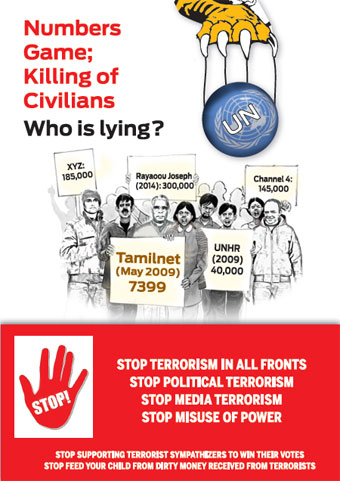Tamils shoot themselves in the foot
By Lakshman Ratnapala
(courtesy of The Sunday Island)
The Sri Lanka Presidential election of November 16 has proven some home truths. The first of these is that the minority Tamil and Muslim voters in the North and the East of the country voted en bloc against Gotabaya Rajapaksa who by sweeping the rest of the country exposed as a fallacy the old theory that no one can win an island-wide election without the support of the northern Tamils.
The Tamils have, obviously shot themselves in their collective foot.
They must now realize that their leaders from Chelvanayakam in the 1950s to Sampanthan today, have been taking them for a ride on the train of separatism, a ride that ended in disaster in the murky waters of Nandikadal lagoon and that their best hope for the realization of their dreams of a bright future lies not in separatism but in working together with their brethren of the Sinhala majority.
Indeed, the majority 55% of the Tamils, who live, work and play as equals with the Sinhalas in the rest of the country outside the North and the East are proof that they can gain much more by cooperating with the majority community than by working against them — for, we are all children of one Mother Lanka who can appreciate our common aspirations for a better life for ourselves and our progeny. Minister Thondaman and his Ceylon Workers Congress comprising the Indian Plantation Workers provide ample poof this contention
The same goes for the Moslems, the majority of whom live outside the Eastern Province. They constitute the majority in even the commercial capital of Colombo, and remained unharmed after the deadly terrorist IS-style bombings on innocent tourist hotels and Christian churches on Easter Sunday this year.
The reasons why the Sinhala majority in the South coalesced solidly around the winning candidate Gotabaya Rajapaksa are many and do not need repetition here. However, it is best that the Tamils of the North remember that the 13-point list of demands presented by the coalition of five racist Tamil political Parties, to the Southern polity was THE principal cause of spreading fear among the Sinhalas of Tamil separatism, if they voted for any candidate who accepted these demands.
These 13 demands are the height of political naivete and I am still unable to reconcile in my mind what could have motivated the Tamil leadership to present them at this particular time. The only rationale I could think of is that these racist Tamil Parties thought they could intimidate the Sinhala candidates into thinking that they could not win without the Tamil votes of the North. It was a huge blunder tantamount to the Tamils shooting themselves in the foot.
It was, therefore, natural that the Sinhalas rallied round their war hero Gotabaya who had trounced the Tamil Tiger terrorists and brought to an end in a mere three years a war that had dragged on for 30 long years; a war that the international community led by the Scandinavians, had claimed was unwinnable because they said the LTTE was an efficient fighting force whereas the Sri Lanka army was not!
The latest news from the European segment of the International Community does not augur well for Sri Lanka when one considers two developments last week. The first of these was a statement in the British Conservative Party’s Election Manifesto advocating a two-State solution for Sri Lanka’s ethnic problem. This is in variance with Sri Lanka’s objective of a Unitary State – an objective which has been endorsed by successive governments of Sri Lanka and all political parties including the minority parties.
It seems obvious that the British Conservatives were seeking the electoral support of the Tamil voting blocs in Britain. The Tamil global diaspora has exercised its clout to achieve through political strategies in countries such as Britain, Canada and Australia what they failed to achieve through terrorism in Sri Lanka – a separate State. This is where all Sri Lankan governments have failed. Whereas the Tamils have established strong political voting blocs abroad, the Sri Lanka governments have meekly surrendered the PR advantage to the Tamil terrorists. True the Conservatives retracted that statement; but only after our High Commission in the UK protested. Nevertheless, I would like to congratulate the Conservatives on their election victory.— better them than the Labour Party as Lord Naseby testifies.
It is time that the new government in Sri Lanka pay as much attention to setting up a global PR network through its embassies whose staff do not seem to understand the elementary ABCs of public relations. Here, I recall that Gotabaya Rajapaksa during his election campaign emphasized the need to reconstruct the country’s intelligence network, dismantled by the previous regime, if he were to deliver on his pledge to provide a safe and a secure living and working environment for all Lankans. Surely, the new President with his experience of working in the field of technology in the United States must know the very high value of Public Relations in winning the hearts and minds of people both in war and peace. Otherwise, one is forced to conjecture whether the Sinhalas, in electing Rajapaksa, have put their collective foot in their mouth.
The second event that caught our attention last week was the attempt by the Swiss Embassy in Colombo to bypass diplomatic protocol and smuggle a Sri Lankan staffer out of the country without divulging the staffer’s name or providing his/her identity documents or passport to the Emigration authorities. This high-handed (un)diplomatic skullduggery should be exposed. The Sri Lankan government at least owes that much to the public. After all, just like Swiss cheese, the story put out by the embassy has holes in it, and the public needs to know the whole truth.
179 Viewers








